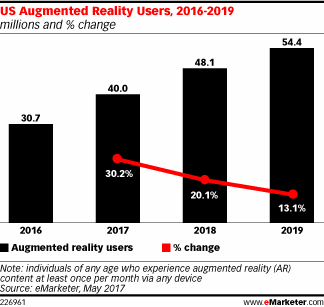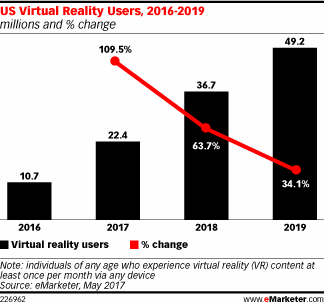VR has been slower to catch on in the US
In 2017, 40.0 million people in the US will engage with some form of augmented reality (AR) at least monthly, up 30.2% over last year, according to eMarketer’s first forecast on AR and virtual reality (VR). Much of AR’s growth will be fueled by Snapchat Lenses and Facebook Stories, while VR usage will be driven by 360-degree videos on social networks.
eMarketer defines AR users as individuals of any age who engage with augmented reality content at least once per month via any device. This year, 12.3% of the US population will engage with some form of AR content.
By the end of 2019, eMarketer projects AR users will top 54.4 million, accounting for 16.4% of the US population, or nearly one in five internet users.
“Users of Snapchat Lenses comprise the vast majority of our AR estimates,” said eMarketer forecasting analyst Chris Bendtsen. “Snapchat growth will continue to contribute to AR users in the future, but in the next several years eMarketer also expects Facebook Stories to be a significant growth driver of AR usage, since it is now widely available to Facebook’s user base.”
Meanwhile, VR has been slower to catch on in the US, and will not reach mass adoption in the foreseeable future.
eMarketer expects 22.4 million people in the US will engage with a form of VR at least monthly this year, up 109.5% over 2016.
eMarketer’s definition of VR includes 360-degree videos, photos and product demos via any device (e.g., connected TVs, desktops/laptops, mobile devices and headsets), and games via headsets. The category is being driven mainly by 360-degree photos and videos on Facebook and YouTube.
The gaming industry is also driving growth of VR headset usage. In 2017, 9.6 million people in the US will use a headset to experience VR monthly, up 98.7% over last year.
While VR headsets provide a more immersive experience, engagement will remain low due to their often high cost. This year, just 2.9% of the US population will use a VR headset at least monthly, eMarketer estimates, with that number growing to just 5.2% by 2019.
by Douglas Clark



